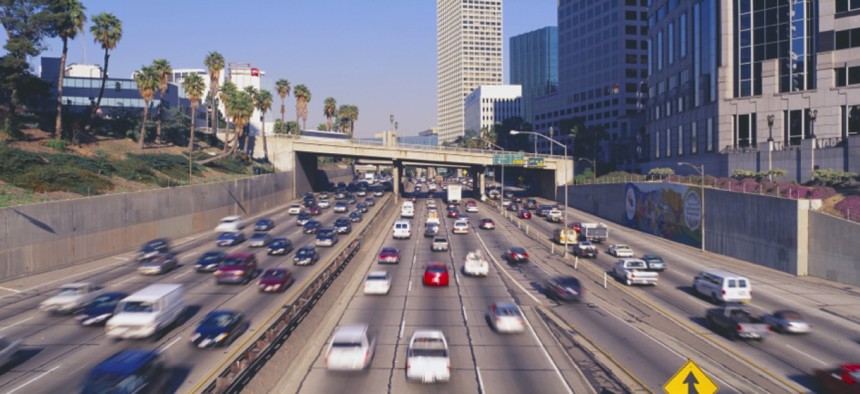Would L.A. County Voters Support a Sales Tax Hike for Transportation's Sake?

Joseph Sohm / Shutterstock.com
The estimated $75 billion in revenue generated over the next 40 years could go toward rail line extensions, added carpool lanes, bus stop upgrades or new bikeway connections.
When Los Angeles County voters go to the polls next November, they could decide on a massive transportation funding measure that would aim to generate upwards of $100 billion in sales tax revenue for road and transit projects over the coming decades.
The initiative has not yet been formally proposed, but there is at least one early indication that it could get some traction. Newly released survey results from the Los Angeles County Metropolitan Transportation Authority show that between 63 and 79 percent of self-described likely voters feel some degree of willingness to support the tax measure.
It would require the backing of at least two-thirds of voters to pass. As described in the survey, the measure would involve making a 30-year one-half cent sales tax increase that voters approved in 2008 permanent, as well as raising the countywide sales tax by one-half cent.
A final decision about whether to put it on the ballot could come next summer.
Speaking at a conference in late April, Los Angeles Mayor Eric Garcetti, who chairs the metropolitan transportation authority’s board of directors, noted that the measure could be a tough sell. “People today,” he said, “are skeptical about tax increases.”
The mayor added: “We have to build an army of people who can rise up to say ‘enough is enough, we want to see new options, and a new city be built, and we’re willing to step up and pay for that out of our own pocket.’”
A long range plan and ballot measure update the transportation authority released on April 21 outlines the potential revenues the tax initiative could provide. It shows that the new half-cent sales tax could produce $75 billion over 40 years. It also projects that extending the existing half-cent tax could raise $46 billion over an 18-year period ending in 2057.
The existing tax was approved as part of a ballot initiative known as Measure R. The transportation authority’s update estimates that it will yield $35 billion over its currently approved 30-year lifespan, which is set to expire in 2039.
If voters were to approve the measure described in the survey, the total sales tax rate in Los Angeles County would rise to 9.5 percent, from 9 percent.
The level of support for the measure among survey respondents varied based on the amount of information they had. When self-reported likely voters responding to the poll were initially asked if they would support the half-cent tax increase and extension of the Measure R tax, 70 percent said “definitely,” “probably,” or that they were undecided but leaning toward yes.
After receiving a brief explanation of the measure, that figure dropped to 63 percent. But once respondents were provided with “more education” about it, the number spiked back up and 79 percent fell into one of the yes categories.
Asked about their top priorities for how they’d like to see transportation funding spent, 35 percent of the self-reported likely voters surveyed said local streets and roads, 27 percent pointed to freeways and highways and 24 percent chose regional light rail and buses.
If it were to pass, the money raised by the measure could pay for a wide range of projects.
As part of an effort to update the transportation authority’s long term plan and guide talks about the ballot measure, the agency has looked for feedback from 88 cities and unincorporated areas across the county to find out what projects they want to see funded.
Nine councils of governments in the county, which represent the local jurisdictions, later submitted lists that amounted to over 2,300 projects. These were outlined in a document issued by the transportation authority on April 15. Included on the list are projects such as rail line extensions, added carpool lanes, bus stop upgrades and new bikeway connections.
The estimated total cost for all of these works is between $150 billion and $275 billion, according to the agency document.
A public opinion research firm conducted the survey about the ballot measure on the transportation authority’s behalf. Between March 17 and 29, the firm used randomly dialed landline and cellphone numbers and relied on interviews with 1,414 Los Angeles County residents. The margin of error for the full sample of respondents was +/- 2.6 percent. For the subset of 863 self-reported registered likely voters it was +/-3.4 percent.
For now, the transportation authority continues to emphasize that no final decisions have been made about whether to move forward with the ballot measure. A potential timeline the agency presented in mid-April shows that the authority’s board members could make a final “go” or “no go” decision in June 2016.
During his remarks at the conference last month, Garcetti noted that when Measure R passed, it was by a thin margin. “This is going to have to be a campaign where, if it moves forward, we’re going to have to be perfect,” he said.
NEXT STORY: States Debate Who's Helped, Hurt in Shifting Tax Burdens






